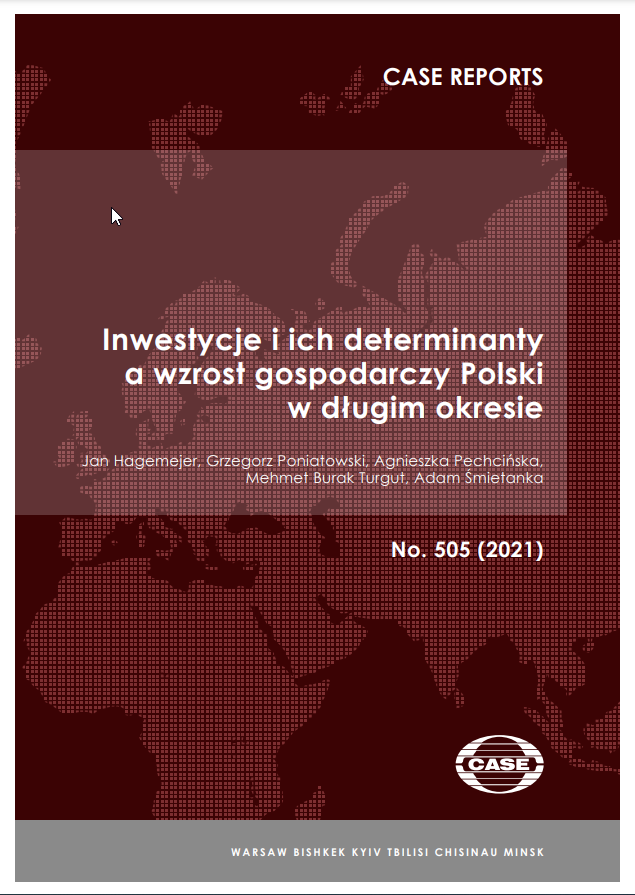 Homepage CASE
Homepage CASE
Selected values

Investments and Their Determinants and Long-term Economic Growth in Poland
-

Adam Śmietanka
Economist
Adam Śmietanka is an Economist at CASE. His areas of expertise include data analysis, data visualization, web scraping, and inflation measurement. At CASE, Mr. Śmietanka is responsible for conducting data analysis, economic research, and developing and maintaining CASE’s online monthly consumer price index. His professional experience includes an internship with PwC’s Advisory Team and a … <a href="https://case.dev10.pro/publications/inwestycje-i-ich-determinanty-a-wzrost-gospodarczy-polski-w-dlugim-okresie-2/">Continued</a>
Articles from this author:
-
VAT compliance gap due to Missing Trader IntraCommunity (MTIC) fraud – Final report: phase 1
The phenomenon of Missing Trader Intra-Community fraud (MTIC fraud) stands out as a significant form of VAT fraud. In this scheme, a fraudulent trader sells goods and services to other businesses, collects the VAT from customers, and then vanishes without remitting it to tax authorities. Despite variations in assessments of its exact scale, both revealed … Continued
-
VAT gap in the EU. Report 2023
This Report has been prepared for the European Commission, DG TAXUD, for the project TAXUD/2019/AO-14, “Study and Reports on the VAT Gap in the EU-28 Member States”, and is a follow-up to the eight reports published between 2013 and 2020. The report provides yearly Value Added Tax (VAT) Gap estimates for the EU-28 covering the … Continued
-
VAT Gap in the EU. Report 2022
VAT is one of the core sources of government revenue in the EU. Meeting the fiscal objective of VAT requires confronting the key challenge of taxpayer non-compliance with VAT payment obligations. It also requires sensible decisions regarding narrowing the tax base or reducing VAT liability for certain parts of the tax base. The relevance … Continued
-
VAT compliance gap due to Missing Trader IntraCommunity (MTIC) fraud – Final report: phase 1
-

Jan Hagemejer
Macroeconomics and Trade Director
Jan Hagemejer’s areas of expertise are international trade as well as macroeconomic and structural issues. He graduated from University of Warsaw where he also obtained his PhD and habilitation, as well as from Purdue University (MA in Economics). He works as an associate professor at the Faculty of Economic Sciences, University of Warsaw. Prior to … <a href="https://case.dev10.pro/publications/inwestycje-i-ich-determinanty-a-wzrost-gospodarczy-polski-w-dlugim-okresie-2/">Continued</a>
Articles from this author:
-
The Impact of Tobacco Product Production on the Polish Economy. 2024 Edition
The document continues research from 2018 and 2020, focusing on the role of the tobacco sector in the Polish economy. The report discusses, among other things, the structure of the industry, its impact on the labor market, contribution to GDP, investments, as well as challenges and future development prospects. It also includes a detailed analysis of the market for innovative products and the taxation of tobacco products, comparing the Polish system with other EU countries. Key conclusions of the report include: In 2023, Poland produced 214.8 billion cigarettes, an increase of 42% compared to 2013, and the total production of tobacco products rose by 70%. Poland is the largest producer of tobacco products in the European Union, with a 39% share of the EU market. In 2023, the market value of traditional tobacco products was 42.9 billion złotys, with cigarettes accounting for the largest share (40.2 billion zł). Tobacco product exports make up 85% of production, and Poland is the main supplier of cigarettes to Germany, Spain, and Italy. Changes in the market for innovative products led to more than an eightfold increase in their sales from 2019 to 2023, reaching an 11.5% market share in 2023. Changes in the taxation structure of tobacco products, such as planned excise tax increases between 2025 and 2027, may affect demand and government revenue. The report also highlights the growing impact of excise and VAT taxes on the state budget and the positive effects of stable excise policies, as seen in Germany and Romania. However, changes in EU legislation and the phenomenon of the grey market remain challenges. In the long term, maintaining investments and promoting innovation could bring further economic benefits to Poland, while increased tax burdens may hinder sector growth.
-
Modelling the environmental impact of agri-food trade policies
In the era of globalization, international trade policies significantly influence the economic and environmental conditions of countries. As environmental concerns grow, it’s important to understand how these trade policies affect sustainable development and identify the strategies needed to achieve positive outcomes for the climate and environment. This analysis aims to evaluate the impact of international … Continued
-
Transatlantic Subnational Innovation Competitiveness Index 2.0
For policymakers to bolster the global competitiveness of their nations and regions, they first must know where they stand. This report benchmarks the 121 regions of Austria, Germany, Hungary, Italy, Poland, Sweden, and the United States using 13 commonly available indicators of strength in the knowledge economy, globalization, and innovation capacity.
-
The Impact of Tobacco Product Production on the Polish Economy. 2024 Edition
Related publications
Thanks for joining us!
You're now part of a community that values [your newsletter's focus]. Get ready to stay informed, inspired, and engaged with our carefully curated content.
